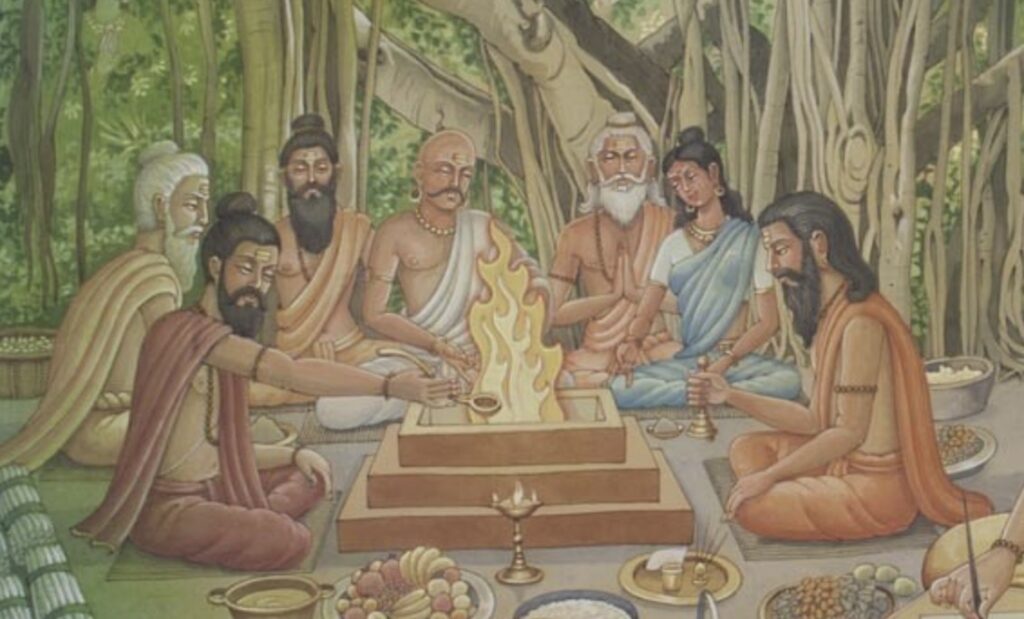Minister’s Message
The various forms of yajna teach us to see beyond our individuality
By Sri Jayendra Puri Swamiji
The primary duty of all humans irrespective of any classification or discrimination is to observe dharma, or righteousness, which implies doing only good and constructive activities and never destructive activities, from birth to demise. This occurs through four stages of life, or ashramas. The first stage is brahmacharya, the student period of scriptural study and acquisition of other knowledge to lead a virtuous life. The second stage is grihastha, the period during which one accepts the life of marriage, begets progeny and lives a virtuous life by providing for society, specifically for people in the other stages. The third stage is vanaprastha, the retirement and respected elder period after having lived a virtuous life and providing for progeny a good livelihood and entry into grihastha stage. The final stage is sannyasa, granting the option of complete renunciation of all desires and total surrender to only God-Realization, subsisting on the barest food and other requirements.
One of the components of dharma is the duty called yajna. Yajna is a collective word for all activities performed for the welfare of mankind, other living beings and the world at large. It is derived from the root yaja, which means “to worship, adore, honor, revere.” Yajna has a threefold meaning: 1) devapuja, offering to God (or Deities), 2) sangatikarana, congregation of virtuous persons, and 3) danam, acts of charity. Danam is often translated defectively into English and other languages as “sacrifice.” Yajna is a compulsory activity for all humans. This is mentioned in the Vedas and various other allied texts.
Our personal expression of dharma and yajna varies through life. As a student brahmachari, one obtains knowledge by studying the sacred scriptures given by great rishis. Since one lives in a group or society, one is helped by associating with fellow beings, like friends and relatives. Brahmacharis are supported by persons in the grihastha stage for food, clothing, shelter and needs. The great seers and ancestors must be remembered with gratitude for their contribution to his overall development.
One’s duties become multifold as he enters the grihastha ashrama. The physical body comprises the panchabhutas, five elements, and is obtained from one’s parents, nourished by the milk of cows and by grains, vegetables and fruits. The devas and the ancestors bless one’s endeavors and activities of daily life. The five sense organs, with whose help one conducts one’s life, are a blessing of the Gods, and thus one learns to be grateful to the Gods who gave him abilities and intellect.
Protecting other living beings, such as cattle, dogs, ants, birds, medicinal plants and trees, is an integral part of Sanatana Dharma. The householder, on whose shoulders rests the responsibility and well-being of all, animate and inanimate, is thus entrusted to care for these speechless beings with due dignity towards them. Food, milk and grains are all provided by this bountiful nature, and man owes gratitude and reverence to plants and trees. Thus, in the overall evolution of man, he learns humility and compassion by providing for and protecting them. The Garuda Purana details the importance of cows, not only for providing material things required for sustenance in this world, but greatly stresses the absolute requirement of a cow, which helps one cross the river of this lifetime to its end, when the soul is transiting from the material world to the yonder world.
The Panchamahayajnas, or five great offerings, are especially important in daily functions for one in the householder stage of life, which is the stage of providing for others. Listed in the Krishna Yajurveda, the Panchamahayajnas comprise five duties as a repayment of the debts we owe to five aspects, or gifts, of God’s manifestation. They are: Deva Yajna, Pitru Yajna, Bhuta Yajna, Manushya Yajna and Brahma Yajna. The performance of these five yajnas is conducive to the overall evolution or growth of a person. An individual in Sanatana Dharma observes these five yajnas daily and gradually learns that one is not a separate entity, isolated creature or isolated unit, but is a part of a great whole.
Deva Yajna is worship of God and the Gods as a repayment of the debt in the form of grace through which we are born as humans and not in any other species, and other unlimited gifts.
Pitru Yajna is leading a virtuous life, performing one’s duties diligently with good fame in the society, as the repayment of the debt to one’s parents and ancestors for the gift of the physical body and the glorious lineage.
Bhuta Yajna is respect towards and protection of nature in the form of other living beings, vegetation and all natural resources and all manifestation, animate or inanimate, as a repayment of the debt of making use of all of them for our benefit.
Manushya Yajna is service to humanity and all fellow human beings as a repayment of the debt for their support in all walks of life.
Brahma Yajna is study of all good texts and sacred literature as a repayment of the debt to the rishis and all gurus and teachers for the knowledge they have given us.
Whenever any of us takes the help of or avails a favor from any of our fellow beings, we say, “Thanks,” “Thanks a million,” “Thanks a lot,” “Much gratitude,” etc., in one’s own language. This could be even the smallest of favors like offering a seat to an elder or to a mother carrying a child. It could be magnanimous favors, like being there for someone for a prolonged period when everything seemed dark.
Keeping this in view, the rishis of Bharat, whose experiences are recorded as sacred lore, implore us to perform these five yajnas in gratitude to all the five gifts, the five manifestations, as guided by the sacred texts.
About the Author

Sri Jayendra Puri Swami is the pontiff of Sri Kailash Ashrama in Bengaluru, India. He aims to revive the glorious heritage of Bhartiya Sanskriti in its totality with due respect and regard for all other world cultures, and to present the goodness of all cultures to all mankind in such a manner that everyone respects the other and ultimately attains God in all glory.
